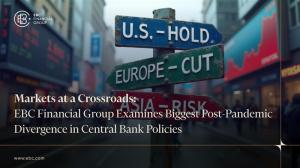Markets at a Crossroads: EBC Financial Group Examines Biggest Post-Pandemic Divergence in Central Bank Policies
Global rate paths diverge as markets react to U.S. tariffs, Eurozone easing, and escalating geopolitical risks.
DC, UNITED STATES, May 8, 2025 /EINPresswire.com/ -- In a world where central banks once moved in lockstep, traders are now facing a dramatically more fractured monetary landscape. On May 7, the U.S. Federal Reserve chose to hold interest rates steady at 4.25% and 4.50%, even as inflationary concerns remain and trade policy tensions escalate. Meanwhile, the European Central Bank cut rates in April, and markets are widely anticipating the Bank of England may follow suit as early as today.
Amid these developments, EBC Financial Group (EBC), a globally regulated brokerage, highlights how this growing monetary policy divergence—combined with renewed geopolitical risks such as rising India–Pakistan tensions—is reshaping trader strategies and creating a demand for insight-driven navigation through volatile markets.
“This is the most significant divergence in major central bank policy we’ve seen since the pandemic recovery period,” noted David Barrett, CEO of EBC Financial Group (UK) Ltd. “The Fed is holding firm, while the European Central Bank has already begun easing—and the Bank of England may follow. For traders, it’s no longer just about the direction of rates, but why the paths are splitting and what that means for global positioning.”
The Fed Hits Pause—But Uncertainty Pushes Play
While the Fed held rates steady, citing a great deal of uncertainty surrounding inflation and the economic effects of new tariffs introduced by President Donald Trump, the European Central Bank broke from its tightening stance last month, lowering its deposit rate by 25 basis points to 2.25%—marking its first rate cut since the pandemic-era normalisation began. This divergence highlights a growing split in how major economies are responding to inflation dynamics, trade-related pressures, and weakening growth indicators.
Fed Chair Jerome Powell’s emphasis on caution—driven in part by uncertainty over the inflationary impact of renewed U.S. tariffs—contrasts with the European Central Bank’s recent pivot toward growth support, as it cut rates to counter flagging momentum across the Eurozone.
Geopolitical Tensions Amplify Market Volatility
Further compounding uncertainty are heightened geopolitical tensions, particularly in Asia, where escalating conflict rhetoric between India and Pakistan has stoked concern over regional market instability, energy price volatility, and safe-haven flows.
“Geopolitical threats are re-emerging as a top-tier market risk,” commented Barrett. “In the past, events like this may have been isolated, but in today’s interconnected financial system, conflict—even perceived—can quickly ripple through currencies, commodities, and investor sentiment globally.”
Gold and oil markets have already reflected these shifts. In the commodities market, gold prices have surged, reaching $3,397 per ounce, as investors seek safe-haven assets amid the escalating conflict and broader economic uncertainties. This uptick reflects a broader trend where geopolitical tensions drive investors toward assets perceived as more stable during periods of uncertainty.
Across asset classes, traders are adjusting not only to data but to the absence of clear global consensus. With some central banks signalling easing, others holding steady, and yet others still under inflationary pressure, the challenge lies in navigating a world where the usual indicators no longer apply universally.
“This is not a moment for passive observation,” added Barrett. “It’s a time when traders must actively interpret, adapt, and stay informed. At EBC, our role is to deliver real-time clarity and perspective—helping clients make smart decisions even when the market narrative is fractured.”
In times of global divergence, EBC remains committed to its mission: empowering traders through education, transparency, and world-class analysis. With regulated operations across key financial markets, the company continues to offer clients institutional-grade platforms, multilingual insights, and expert-driven commentary tailored to evolving macro conditions.
Whether it’s rate cycles, regional flashpoints, or commodity volatility, EBC equips traders with the context they need to move with confidence—rather than react to confusion.
For more information on EBC, please visit https://www.ebc.com.
About EBC Financial Group
Founded in London’s esteemed financial district, EBC Financial Group (EBC) is renowned for its expertise in financial brokerage and asset management. With offices in key financial hubs—including London, Sydney, Hong Kong, Singapore, the Cayman Islands, Bangkok, Limassol, and emerging markets in Latin America, Asia, and Africa—EBC enables retail, professional, and institutional investors to access a wide range of global markets and trading opportunities, including currencies, commodities, shares, and indices.
Recognised with multiple awards, EBC is committed to upholding ethical standards and these subsidiaries are licensed and regulated within their respective jurisdictions. EBC Financial Group (UK) Limited is regulated by the UK's Financial Conduct Authority (FCA); EBC Financial Group (Cayman) Limited is regulated by the Cayman Islands Monetary Authority (CIMA); EBC Financial Group (Australia) Pty Ltd, and EBC Asset Management Pty Ltd are regulated by Australia's Securities and Investments Commission (ASIC); EBC Financial (MU) Ltd is authorised and regulated by the Financial Services Commission Mauritius (FSC).
At the core of EBC are a team of industry veterans with over 40 years of experience in major financial institutions. Having navigated key economic cycles from the Plaza Accord and 2015 Swiss franc crisis to the market upheavals of the COVID-19 pandemic. We foster a culture where integrity, respect, and client asset security are paramount, ensuring that every investor relationship is handled with the utmost seriousness it deserves.
As the Official Foreign Exchange Partner of FC Barcelona, EBC provides specialised services across Asia, LATAM, the Middle East, Africa, and Oceania. Through its partnership with the UN Foundation and United to Beat Malaria, the company contributes to global health initiatives. EBC also supports the 'What Economists Really Do' public engagement series by Oxford University's Department of Economics, helping to demystify economics and its application to major societal challenges, fostering greater public understanding and dialogue.
Michelle Siow
EBC Financial Group
+60 16-337 6040
email us here
Visit us on social media:
LinkedIn
Instagram
Facebook
YouTube
X
Other
Legal Disclaimer:
EIN Presswire provides this news content "as is" without warranty of any kind. We do not accept any responsibility or liability for the accuracy, content, images, videos, licenses, completeness, legality, or reliability of the information contained in this article. If you have any complaints or copyright issues related to this article, kindly contact the author above.
Bounce Online Solidifies Position as One of South Africa's Leading Online DJ Equipment Retailers
One Click SEO Unveils One Click GEO & Aura: Pioneering Brand Visibility in the AI-First Search Economy
Arun Kumar Palathumpattu Thankappan Leads Public Sector Innovation with Amorphic by Cloudwick
Więcej ważnych informacji
 Jedynka Newserii
Jedynka Newserii

 Jedynka Newserii
Jedynka Newserii

Handel

Mercosur to tylko wierzchołek góry lodowej. UE ma ponad 40 umów handlowych, które mogą destabilizować rynek rolny
Umowa handlowa między UE a krajami Mercosur może znacząco zaburzyć konkurencję na rynku rolnym i osłabić pozycję unijnych, w tym polskich, producentów – ostrzegają rolnicy i producenci żywności. Umowie sprzeciwia się część krajów unijnych, które domagają się klauzuli ochronnych oraz limitów importowych. – Problemem jest jednak nie tylko ta konkretna umowa. Chodzi o cały system wolnego handlu, który się kumuluje z dziesiątek innych porozumień – podkreśla Andrzej Gantner, wiceprezes Polskiej Federacji Producentów Żywności.
Firma
Dzięki zdalnej weryfikacji tożsamości z wykorzystaniem AI firmy zminimalizowały liczbę oszustw. Rozwiązania wykorzystuje głównie sektor finansowy

Z najnowszych danych Eurostatu wynika, że w 2024 roku 5,9 proc. polskich firm korzystało z rozwiązań z zakresu sztucznej inteligencji. W 2023 roku był to odsetek na poziomie 3,67 proc. Wciąż jednak jest to wynik poniżej średniej unijnej, która wyniosła 13,48 proc. Jednym z obszarów, który cieszy się coraz większym zainteresowaniem wśród przedsiębiorców, jest weryfikacja tożsamości przez AI, zwłaszcza w takich branżach jak bankowość, ubezpieczenia czy turystyka. Jej zastosowanie ma na celu głównie przeciwdziałać oszustwom i spełniać wymogi regulacyjne.
Prawo
Daniel Obajtek: Własne wydobycie i operacyjne magazyny to filary bezpieczeństwa. Zgoda na magazyny gazu poza krajem to rezygnacja z suwerenności energetycznej

Były prezes Orlenu ostrzega przed zmianami w ustawie o zapasach ropy naftowej, produktów naftowych i gazu ziemnego. Jego zdaniem przygotowana przez rząd nowelizacja tzw. ustawy magazynowej i ujednolicanie unijnej polityki energetycznej to zagrożenie dla bezpieczeństwa energetycznego Polski. W jego opinii tylko silna spółka narodowa, własne wydobycie, krajowe magazyny i zbilansowany miks energetyczny zapewnią Polsce bezpieczeństwo i konkurencyjność.
Partner serwisu
Szkolenia

Akademia Newserii
Akademia Newserii to projekt, w ramach którego najlepsi polscy dziennikarze biznesowi, giełdowi oraz lifestylowi, a także szkoleniowcy z wieloletnim doświadczeniem dzielą się swoją wiedzą nt. pracy z mediami.





![Nestlé w Polsce podsumowuje wpływ na krajową gospodarkę. Firma wygenerowała 0,6 proc. polskiego PKB [DEPESZA]](https://www.newseria.pl/files/1097841585/fabryka-nesquik_1,w_85,r_png,_small.png)



.gif)

 |
| |
| |
|